
Register with Plumtri!
Register on plumtri as an Individual or as an Organisation to gain access to all of its useful features and remain updated on the latest R&I news, events and funding opportunities.
-
 Welcome to plumtriA platform for Research & Innovation
Welcome to plumtriA platform for Research & Innovation -
 Looking for Funding?Check out the current open calls
Looking for Funding?Check out the current open calls -
 Register today to start receiving our monthly newsletter
Register today to start receiving our monthly newsletter -
 Looking to partner up?Search our list of registered profiles
Looking to partner up?Search our list of registered profiles -
 You have questions on a particular funding programme?
You have questions on a particular funding programme?
Sejħiet għal Finanzjament
Filter
Calls
Access2 Partnerships (A2P) Scheme 2025
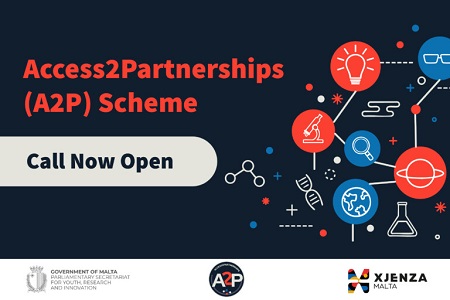
Source of Funding: Xjenza Malta
Funding Opportunity for Malta-based Researchers to Join R&I proposals under various Horizon Europe Partnerships – Apply Now!
Are you looking for funding to participate in international R&I projects within Horizon Europe Partnerships where Malta is not an official funding partner?
The A2P Scheme is now open and enables Malta-based researchers to participate in transnational calls for R&I projects from over 50 initiatives across various thematic areas, including health (such as pandemic preparedness, rare diseases, and personalised medicine), climate, energy and mobility, digital technologies, food and bioeconomy, natural resources, and environment.
Funding Opportunities:
- Support for Malta-based self-funded partners up to €300,000 per project (first-come, first-served basis)
- Assistance with administrative processes, including Letter of Intent for eligible applicants. This letter may be required during the Partnership’s pre-proposal submission as proof of funds availability for the self-funded partner.
Visit the below link to read about the dligibility and application process.
For questions or additional information, please contact eusubmissions.xjenzamalta@gov.mt.
Applications are accepted on a rolling basis – we strongly encourage early submissions to secure funding availability!
Deadline: 15 working days prior to the pre-proposal deadline
By participating in this short 5–10 minute survey, you’ll help us identify challenges, refine funding initiatives, and enhance support services tailored to your needs. Your insights will directly contribute to improving access to EU partnerships and dedicated support schemes like A2P.
Information and image source:
Cancer Research Programme 2025 Call
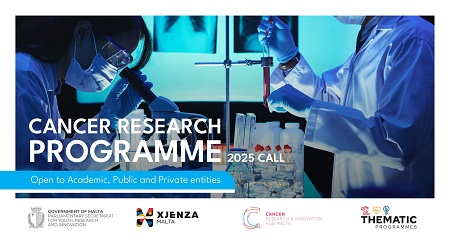
Source of Funding: Xjenza Malta
Following the successful launch of the 1st call of the Cancer Research Programme, this year the 2nd call for this programme is now open!
The Cancer Research Programme aims to support research that might in the future help reduce the incidence of cancer, improve cancer treatment, survival, and the quality of life of cancer patients.
The Cancer Research Programme aims to support capacity-building efforts related to:
- Molecular Research and Diagnostic Innovations
- Community-Based Cancer Research
- Therapeutic Development and Clinical Strategies
- Psychosocial Support and Patient-Centred Approaches
It aims to support fundamental and translational research including genetic, pharmacogenomic, proteomics, pharmaceutical, cellular, and pre-clinical in vivo research into the causes, mechanisms, diagnosis, treatment or prevention of cancer as well as research targeting psychosocial aspects of cancer, its treatment and survival.
Programme Parameters
| Maximum Possible Grant Amount | € 300,000 |
|---|---|
| Project Duration | 36 months |
| Eligibility | Maltese Registered Legal Entities from Public, Private and Academic Institutions, as sole beneficiaries or through a consortium |
| Application Submission | Electronically to ri.xjenzamalta@gov.mt keeping david.camilleri.4@gov.mt & giulia.aquilina@gov.mt in copy |
| Deadline | 12 May 2025 |
If state aid is applicable, applicants are to apply under the de minimis regulation or the GBER.
The following figure summarises the different Priority Areas and Subareas of Cancer Research which will be the focal topics of this Programme:
| Priority Areas | Molecular Research and Diagnostic Innovations | Community-Based Cancer Research | Therapeutic Development and Clinical Strategies | Psychosocial Support and Patient-Centred Approaches (for cancer patients and carers) |
|---|---|---|---|---|
| Subareas | Molecular Mechanisms
Molecular Diagnostics Theranostics (Therapy combined with Diagnostics) |
Community engagement to enhance effectiveness of cancer prevention
Community engagement for early detection strategies |
Biological Therapeutics
Pharmaceutical Therapeutics Proximity to cure Pre-clinical Innovation Clinical Methodologies |
Emotional Support
Social Support Psychological Support |
If state aid is applicable, applicants are to apply under the de minimis regulation or the GBER.
Visit the below link to read further and download guidelines and application forms.
Information Session
An online information event on the Cancer Research Programme will be held to provide an overview on this call, which is another Thematic Programme for 2025.
Date: 28 March 2025
Time: 11:00 CET
Click here to access the Registration Form
Information and image source:
Xjenza Malta – Consiglio Nazionale delle Ricerche (CNR) 2025 Joint Call for Research Proposals
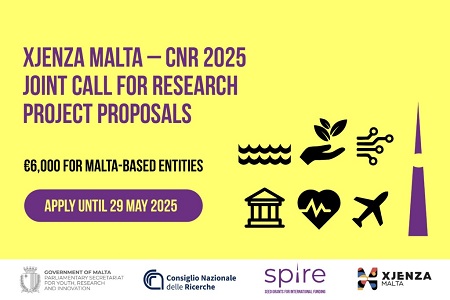
Source of Funding: Xjenza Malta and Consiglio Nazionale delle Ricerche (CNR)
Xjenza Malta and the Consiglio Nazionale delle Ricerche (CNR) have launched the 2025 Joint Call for Research Proposals under the SPIRE Programme. This initiative aims to strengthen research collaborations between Malta-based and CNR researchers by providing seed grants for small-scale projects that pave the way for larger future research efforts.
The SPIRE: Seed Grants for International Research Programme enhances Malta’s international research collaboration by facilitating joint calls with international partners. Through multi-annual calls, SPIRE supports projects that foster research partnerships, promote knowledge exchange, and serve as a foundation for larger-scale initiatives.
Funding & Project Details for the Xjenza Malta-CNR Joint Call
- Funding: Up to €6,000 for the Malta-based consortium (at least one Malta-based partner). The financial contribution to Malta-based entities shall be 100% of the eligible costs incurred.
- Project Duration: 24 months (1 January 2026 – 31 December 2027)
- Application Deadline: 29th May 2025, 12:00 PM CET
- Technology Readiness Levels (TRL): 1–7
Thematic Areas
Proposals must align with at least one of the following focus areas:
- Marine and Maritime
- Digital Technologies
- Health
- Sustainable Use of Resources
- Smart Manufacturing
- Aerospace, Aviation, and Space
- Cultural Heritage
Who Can Apply?
Each consortium must include:
- At least one eligible Malta-based entity
- At least one CNR researcher
Projects should be balanced in terms of workload and funding distribution between the two partners.
Download the guidelines on eligibility and application forms from the below link.
Online Information Session
Xjenza Malta will be hosting an online information session on 27 March from 10:00 to 11:00 AM CET to introduce the SPIRE Programme and the Xjenza Malta – CNR 2025 Joint Call for Research Proposals. This session will cover key details about the call, eligibility criteria, and the application process. Interested participants can register here.
Information and image source:
Technology Development Programme LITE (TDP LITE) 2025
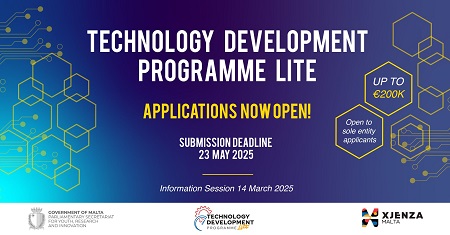
Source of Funding: Xjenza Malta
Xjenza Malta is receiving proposals under the Technology Development Programme Lite (TDP Lite).
The TDP Lite is a national funding programme aimed at providing support for the development of innovative projects proposed by public entities or industry players. The programme is designed to provide Maltese innovators with an expedited route to develop and demonstrate their novel technologies.
TDP Lite provides financial support of up to €200,000 for sole entities to carry out research, development and innovation, with the SMART Specialisation Areas:
- Aviation and Aerospace
- Future Digital Technology
- Health and Well-being
- Marine and Maritime Technology
- Smart Manufacturing
- Sustainable Use of Resources
In order to be an eligible applicant under this funding programme, the technology must be at a minimum Technology Readiness Level (TRL) of 4 and must increase to a maximum of 7 by the end of the project. The TDP Lite covers a duration of 12 or 18 months.
Interested applicants are to submit their application form electronically to rtdi.xjenzamalta@gov.mt keeping in copy Ms Mariah Vella at mariah.vella.5@gov.mt and Mr Kyle Bonnici at kyle.bonnici.4@gov.mt with ‘TDP Lite 2025 Application’ as the subject heading. The application must be dated and signed by the applicant and the legal representative. All received applications shall be acknowledged by email.
The deadline for submission is Friday 23 May 2025 at 11:59 p.m. Late or incomplete applications will not be considered.
An online information session will be held on Friday 14 March 2025 at 10:00a.m. This information session is intended to provide further information on the call. Any interested parties are encouraged to click here to access the registration form.
Further information can be found in the guidelines documents found on the below link. Alternatively, interested parties may contact Ms Mariah Vella on 23602114.
Information and image source:
M-ERA.NET Joint Call 2025
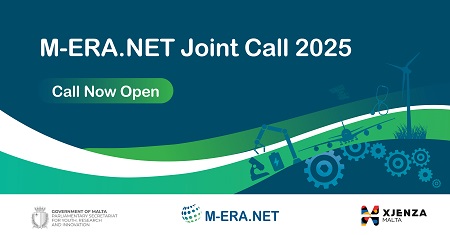
Source of Funding: Xjenza Malta
Funding Opportunity for Malta-based Researchers to Innovate in Advanced Materials & Battery Technologies – Apply Now!
M-ERA.NET is a European-funded initiative that supports research and innovation in materials science and battery technologies, aligning with the European Green Deal. The M-ERA.NET Joint Call 2025 is now open click to view call— with particular emphasis on clean energy technologies, future batteries, circular economy, and the integration of digital technologies.
Funding Opportunities:
Malta-based entities are eligible to apply for up to € 300,000 in funding, allowing them to join a consortium and submit a proposal for this Call (N.B. if multiple national partners are included in a single consortium, the total funding for all Maltese participants combined cannot exceed the €300,000 cap).
Apply under focused thematic areas:
- Sustainable Materials for Energy Applications
- Innovative Surfaces, Coatings, and Interfaces
- Advanced Composites and Lightweight Materials
- Functional Materials
- Materials Addressing Environmental Challenges
- Next Generation Materials for Electronics
Eligibility & Application Process
To be eligible, applicants must:
- Carefully review the Call text 2025 and Guidance for applicants: Click to view the call text 2025 and Guidance
- Be a Malta-based entity, including private and public organisations, Research & Knowledge Dissemination Organisations (RKDOs), and other, with an operating base in Malta in accordance with the click to download the State Aid or click to download the Non-State Aid National Rules for Participation;
- Complete and submit a National Application Form duly signed and supported by the required Annexes. These can be downloaded from the Xjenza Malta click to visit the Resource Page (Application Resources).
Application Deadlines
- Project coordinator needs to submit the pre-proposal via the M-ERA.NET Electronic Submission System by the 13 May 2025, 12:00 CET
- Each Malta-based applicant must submit a National Application Form to xjenzamalta@gov.mt by the 13 May 2025, 23:59 CET.
Call webinars
- Announcement: M-ERA.NET Call 2025 information webinar on 25 March 2025, 12:00 – 13:30 (Brussels time) – Registration link soon available
M.ERA-NET website: https://www.m-era.net/
For more information, please contact us at eusubmissions.xjenzamalta@gov.mt / +356 23602152
Information and image source:
Cascade Funding Opportunities closing in March 2025
Visit the below link to view the 21 funding opportunities under Cascade Funding, an instrument by the European Commission.
Please note that these calls have different deadlines within the month of March 2025.
Information and image source:
Call for Proposals RFCS-2025-JT-Big Tickets for Coal
Source of Funding: European Commission
Project results are expected to contribute to all the following impacts:
- Contribute to achieving the European Green Deal goals.
- Demonstrate overall positive environmental and, if relevant, health and safety impact of the technology and/or the approach pursued.
Expected Outcome:
Project results are expected to contribute to all the following outcomes:
- Contribute to the ambitious targets of the European Green Deal.
- Outline a continuation plan for technology scalability and greater expansion, ultimately linked to a viable business case.
- Provide high visibility dissemination of lessons learnt and continue to contribute to the development of skills and creation/conversion of jobs.
Objective:
The RFCS Research Programme (Council Decision (EU) 2021/1094) has the following research objectives for the coal sector:
- supporting the just transition of the coal sector and regions (Article 4).
- improving health and safety (Article 5).
- minimising the environmental impacts of coal mines in transition (Article 6).
The call objectives are:
- Repurposing of formerly operating coal and lignite mines or those in the process of closure and coal-related infrastructure including power supply services.
- Materials and waste reuse, and development of alternative materials, including recovery of critical raw materials.
- Land monitoring, modelling, stabilisation and/or restoration.
- Processing of methane emissions.
- Monitoring, management and/or treatment of mine water and water tables in coal mines in the process of closure and formerly operating mines.
Scope:
Applicants may submit proposals for either pilot or demonstration projects (see Articles 15 and 16 of Council Decision 2008/376/EC).
Proposals must be in line with Council Decision (EU) 2021/1094.
Proposals should address the application of innovative technologies related to one or two of the five call objectives listed above. If addressing two call objectives, proposals should clearly identify which work packages address which call objective(s).
Proposals must include an exploitation strategy outlining possible integration of the deliverables of the project (including the pilot/demonstrators) in an industrial environment and a preliminary assessment of their economic viability. Where relevant, they can also describe activities related to economic analysis for the purposes of constructing a business case or new business models.
Activities are expected to achieve technology readiness level 7-8 (TRL 7-8) by the end of the project.
In line with Article 2 of RFCS Council Decision (EU) 2021/1094, research and technological development funded under the RFCS must be in line with the Just Transition Mechanism goals.
Proposals will have to demonstrate how they will support the social and economic revitalisation of the former coal mine regions, in line with the relevant Territorial Just Transition Plans. Proposals must involve the local community and focus on communication with stakeholders, including the public.
Proposals are expected to include activities to:
- promote the development of efficient reskilling and upskilling programmes for workers affected by a coal phase-out, including research on the training and reskilling of workers employed or previously employed in the coal sector, in accordance with Article 4 (e) of RFCS Council Decision (EU) 2021/1094.
- address potential solutions that improve working conditions for employees of the coal mines being phased out, in particular health, safety, and ergonomics in and around the workplace, in accordance with Article 5 of RFCS Council Decision (EU) 2021/1094.
Visit the below link to read further.
Information source:
Call for Proposals RFCS-2025-CSP-Big Tickets for Steel
Source of Funding: European Commission
Expected Impact:
Project results are expected to contribute to the following impact:
- Contribute to the ambitious targets of the European Green Deal and the set of European Commission policy guidelines applicable to the steel industry for full decarbonisation of the steel sector.
Expected Outcome:
Project results are expected to contribute to all the following outcomes:
- Contribute and clearly quantify the CO2 reduction achieved in the steel sector or in the target group.
- Make it technically and economically feasible for novel technologies and processes to produce the same products as current industrial processes, as demonstrated and validated at suitable scale.
- Demonstrate overall positive environmental and, if relevant, health and safety effects of the technology and/or the approach pursued.
- Outline a plan for technology scalability and greater expansion, ultimately linked to a viable business case.
- Provide high visibility dissemination of lessons learnt and continue to contribute to the development of skills and creation/conversion of jobs.
Objective:
The RFCS Research Programme (Council Decision (EU) 2021/1094) has the following research objectives for the steel sector:
- new, sustainable and low-carbon steelmaking and finishing processes (Article 8).
- advanced steel grades and applications (Article 9).
- conservation of resources, protection of the environment and circular economy (Article 10).
- management of work force and working conditions (Article 10a).
The call objectives are:
- Cross cutting issues: digitalisation, skills and social innovation in the steel sector.
- CO2 neutral iron ore reduction (Increasing the use of pre-reduced iron carriers).
- Technologies to improve energy efficiency, increase heat recovery and enhance process integration (PI) approaches in steel production.
- Advanced steel alloys for special applications.
- Circular economy and sector coupling solutions to meet the zero-waste goal for steelmaking.
- Carbon capture of steel CO/CO2 gases.
Scope:
- Applicants may submit proposals for either Pilot or Demonstration projects (see Articles 15 and 16 of Council Decision (EU) 2008/376/EC).
- Proposals are expected to achieve technology readiness level 7-8 (TRL 7-8) by the end of the project. Research activities must take account of the requirements of the selected TRL levels.
- Proposals must be in line with the general and specific objectives listed in the Memorandum of Understanding for the European partnership on Clean Steel launched in Horizon Europe.
- Proposals need to show in the excellence and/or impact part of the application form how they contribute to the multiannual strategic R&I agenda of the Clean Steel Partnership.
- Proposals must address the application of innovative technologies related to one or two of the six call objectives listed above. If addressing two call objectives, proposals should clearly identify which work packages address which area(s) of which call objective(s).
- Proposals must include an exploitation strategy outlining possible integration of the outcomes of the project (including the pilot/demonstrators) in an industrial environment and a preliminary assessment of their economic viability.
- When addressing the call objectives, proposals should pay particular attention, where relevant, to Article 10a of RFCS Council Decision (EU) 2021/1094 and, more precisely, include activities to address potential solutions that can improve the working conditions of employees at steelmaking facilities, in particular health, safety and ergonomics in and around the workplace.
- Targeted improvements (compared to the existing installation or, for new projects, to the relevant ETS benchmark) must be clearly quantified and demonstrated with energy system and materials balance assessments (including emissions) clearly defined by the applicants. This requirement applies to all the call objectives, with the exception of objective 1.
- Collaborations with start-ups and small and medium-sized enterprise are encouraged.
Visit the below link to read further.
Information source:
Intellectual Property Registration (IPR) Voucher
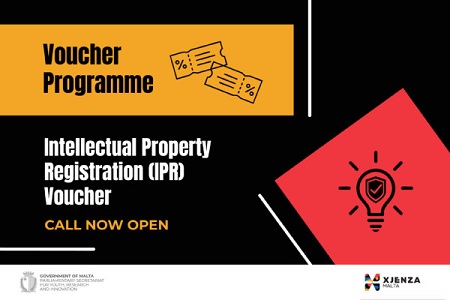
Source of Funding: Xjenza Malta
The Intellectual Property Registration (IPR) Voucher provides inventors with essential financial support and guidance to protect their creations against potential infringement. Innovators can apply for national protection through the Malta Industrial Property Registration system. At a European level, the EU Intellectual Property Office (EUIPO) offers broader protection across EU Member States, while international registration through the World Intellectual Property Organization (WIPO) is also available for globally safeguarding Maltese IP rights.
Types of Intellectual Property Rights
There are five main types of intellectual property rights:
- Trademarks – Unique graphics that distinguish products or services.
- Copyrights – Automatically granted protection for original works upon creation.
- Industrial Designs – Protects the aesthetic design aspects of an object, requiring novelty.
- Trade Secrets – Protects commercially valuable, confidential information under strict conditions.
- Patents – Exclusive rights for innovative products or processes, granting 20 years of protection from the application date.
IP Registration Process
The IPR Voucher supports a streamlined registration process, which typically takes one to three years from the initial application. During this time, the service provider will:
- Update the IP Check report, recommending specific IP rights to pursue based on an initial 4-week review period.
- Collaborate on timelines for each stage of the process.
- Support the beneficiary through every phase, from updating the IP Check report to patent publication.
Reimbursements will be issued by Xjenza Malta upon submission of payment receipts.
Financial Support for Novel Technologies
The Voucher provides financial support for novel technologies that have reached the prototype stage (TRL 5+) with a Xjenza Malta-approved research grant. This ensures inventors can protect their intellectual property rights and safeguard their inventions from potential infringement.
Information Session and Application Details
An online information session with more details on the IPR Voucher will be held on:
- Date: Tuesday, 25th February 2025
- Registration: Click here to register.
Submission Process: Application forms can be sent electronically to voucher.xjenzamalta@gov.mt, keeping Kyle Bonnici (kyle.bonnici.4@gov.mt) in copy. Use the subject line: “Intellectual Property Registration – Voucher Submission.”
Note: It is the applicant’s responsibility to ensure confirmation of receipt is provided.
Contact Information
For further information, please contact:
- Mr. Kyle Bonnici
- Email: kyle.bonnici.4@gov.mt
- Phone: (+356) 2360 2209
Visit the below link to download application forms and guidelines.
Information and image source:
Science for Good Environmental Status (S4GES) – 2025 Call
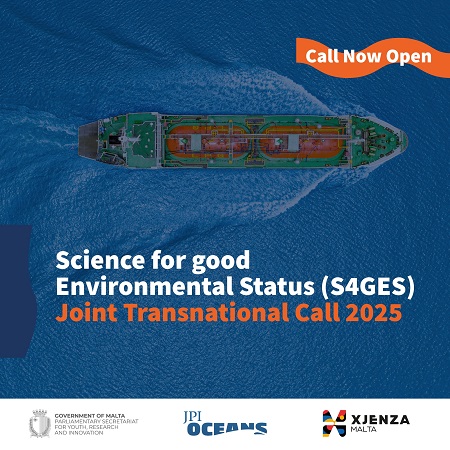
Source of Funding: Xjenza Malta
JPI Oceans aims to advance scientific knowledge and methodologies supporting the Marine Strategy Framework Directive (MSFD) implementation through process-based approaches to environmental status assessment.
The scope of this joint call builds upon the successful pilot phase of S4GES, which demonstrated the effectiveness of process-based sampling approaches for marine environmental assessment. The conceptual framework was particularly well-received, with Belgium already incorporating elements into their national monitoring strategy.
This joint call addresses critical knowledge gaps and enhances the scientific basis underpinning the Marine Strategy Framework Directive (MSFD). By consolidating existing knowledge and integrating innovative, process-based monitoring approaches, the joint call further aims to improve the accuracy and effectiveness of environmental assessments.
Call Objectives
- Consolidating the Science Base for the implementation of MSFD
- Build on the achievements of the first phase by integrating new findings with existing knowledge.
- Enhance the scientific foundation supporting the MSFD to achieve its targets more effectively.
- Supporting an improved definition and measurement of Good Environmental Status
- Specific research on scientific aspects that need further elaboration to better define and measure GES
- Develop and implement methodologies and strategies to better define and measure GES.
- Supporting the implementation of a process-based approach to GES:
- Define, apply and test process-based monitoring strategies and protocols across different sea basins to improve the relevance and quality of observations and data collection in MFSD with the aim of better using resources more efficiently and reaching more effective targets
- Exploit existing and/or propose new augmented observation infrastructure(s) through joint international collaboration
Entities in Malta are eligible for funding, with the option of requesting up to €150,000 to participate in CETPartnership proposal consortia. As per the partnership call text, the project consortium must include at least one eligible partner from Belgium, Ireland, Italy, and Malta. It is to be noted that if more than one national partner is present in one consortium, the total amount of funding for the participating national partners cannot exceed the €150,000 cap.
For further information on this year’s call, kindly refer to the Call Text, National Application Form, as well as the National Rules for participation for State Aid, and Non-State Aid. Annexes can be downloaded from this link.
To apply, the below need to be submitted by the pre-proposal deadline:
- The project coordinator needs to submit the project pre-proposal on the link provided: Click to visit JPI Oceans website by the 1st of April 2025 at 17:00 CET.
- Each National applicant shall be required to submit a National Application Form to xjenzamalta@gov.mt by the 1st of April 2025 at 23:59CET.
For further information please contact the programme officers Ms Christy Baldacchino at christy.baldacchino.2@gov.mt, (+356) 2360 2158, copying in eusubmissions.xjenzamalta@gov.mt.
Visit the below link to download call guidelines and application forms.
